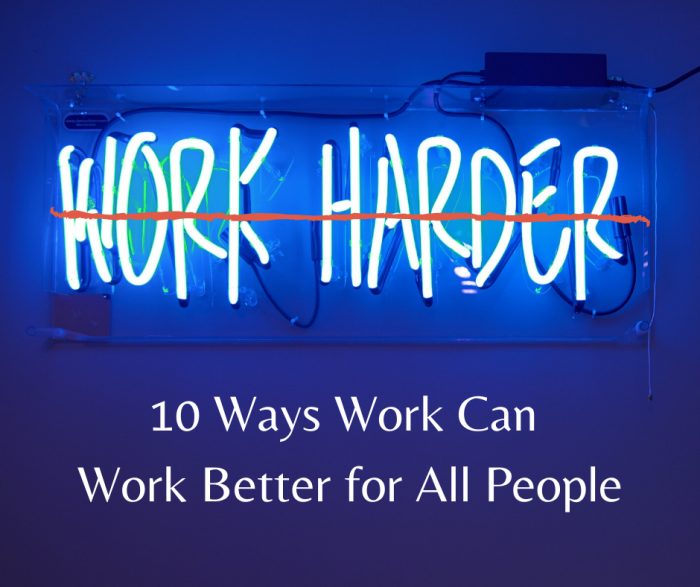Crisis as Opportunity
The opportunity to reshape the future has always been theoretically available, but the urgency to design a future that supports our full humanity is now upon us. The global pandemic has rocked traditional systems and workplaces in a way that leaves us wondering what will come next. Take active steps toward creating what will come next by gathering our community and asking the question: how is work working and how is it not working for us?
I’d like to take a step back here at the outset to acknowledge my privilege in being able to hold the view of crisis as an opportunity for transformation. I am a white, able-bodied, cis-gender, straight man. I have resources, power, time, space, a steady job, and the support of people around me. It is from this place of privilege that I offer this reflection.
The Urgency
If we look deeply at some of the building blocks of our society, they are revealed as absurd, unjust, and cancerous. Greed, serial distraction, over-working, privilege, exaggerated individualism, and discrimination have created structures designed to benefit some at the expense of others. We are drawing our communities smaller and smaller. We are living in homogenous echo chambers where we are delivered “content” designed to reinforce our own biases rather than challenge us to be uncomfortable and grow our circle of awareness.
We have been thinking deeply about what it means to belong to a community, how we can care for each other in crisis, and what the intersection of personal meditation practice and social responsibility looks like. We are sitting with our own feelings of powerlessness and rage as the truth of health and economic inequities built into systems across our country and society are laid bare. We are not only examining how we can help transform systems and communities, but also how we ourselves have participated in, benefited from, and perpetuated the structures that have marginalized communities of color and other disenfranchised groups.
These deep inquiries into our own lives, our organization, our community, and our society led to a series of online conversations. Although there are many systems in place that urgently need change, one focus of these conversations has been the workplace. We recognize that these days do not call for half-measures and subtle interventions, but a wholesale re-evaluation of how we have structured work life. We have an important opportunity to surrender the structures, activities, and rules that are not serving us.
Through our work, we exchange our time, energy, and care for money, resources, healthcare, power, and purpose. This central energy exchange in our lives deserves close examination. Some vital part of our humanity is getting lost in the transaction. So, in our online discussions, we started with a question: what kind of work ecosystem do we want to create for the future? Or: is work working?
Keep Looking
So, how can we redesign a normal that serves and supports our full humanity? I don’t know. It’s clear that no one really knows. It takes radical boldness to admit our not knowing, and yet it’s critically important to stay in the unknown together.
We do know that the same tired answers are no longer sufficient and that we must start making changes before we are ready. We can’t let the perfect be the enemy of the good. “Don’t waste a good emergency,” the saying goes. This is why we need mindfulness practice more than ever—to ground us in the not knowing. Most of us would prefer a safe and familiar answer than to sit with an uncomfortable and difficult question. The Persian and Islamic poet Rumi makes the challenging invitation powerfully clear: “Don’t turn away. Keep your gaze on the bandaged place. That’s where the light enters you.” Mindfulness widens our personal river banks so we have more grounded position to hold and contemplate challenging questions that stream through this difficult moment; it provides a sturdy footing from which to recognize and eventually welcome inconvenient and uncomfortable truths. This is the spiritual life—to wake up to the truth of life more and more fully. We practice mindfulness because we want to see life clearly. We practice so that we can respond with wisdom and compassion. We practice to alleviate our own suffering and the suffering of others. We practice to acknowledge how we create suffering for ourselves and for others. We practice to heal.
With a grounding of mindfulness practice and a commitment to alleviating suffering, here’s a list of insights and changes to our work life that I’ve heard in the past 10 weeks. This list is by no means systematic or exhaustive. These thoughts are fragmentary, iterative, and evolving in real time. They are seeds to be planted, watered, nurtured, and pruned.
How to Use this Post
Knowledge is power. Share with your friends and colleagues. Share with leadership in your businesses and organization. Create a small discussion group to explore these questions. Give yourself permission to design the future you want to inhabit. Ask yourselves, which of the following insights do you have the most energy for? Which insight do you find yourself least energized by? Recognizing our connection brings us strength. Having courageous conversations is needed now more than ever. May the following insights and questions inspire and challenge your own community to begin a brave conversation around the thriving, creativity, and wellbeing of all people.
- Equity
Who is in our community or workplace? Who is not in our community and why? What barriers, real or perceived, intention or unintentional need to be addressed? What privilege and power do I hold, and how does that affect my work and relationships? How can we co-create workplaces that are safe and empowering for everyone? - Truth-telling
Racism is a pervasive part of white American culture. Are we having consistent, brave, ongoing conversations about bias, race, and the role of privilege in our community or workplace? Are we actively working to heal racism inside of ourselves, in our communities, and in society at large?
- Preserving Pandemic Wisdom
What disruptions caused by this global pandemic need to be saved? What cultural habits, patterns, and policies need to be changed or let go of?
- Contemplative Practice
Seeing clearly and cultivating compassion to accept what is seen requires practices. Mindfulness and meditation are two ways to ground ourselves in the moment, and to grow awareness and acceptance. Ask your team how some kind of mindfulness and resilience practice can become a fixture in your workplace. - Fear
Fear is just as viral as the coronavirus. Our wisest decisions are not made from fear. How does fear show up in your work and personal relationships? How does it show up in your community? When you are in a fearful place, can you pause before letting fears drive you to action? - Proceed at the Pace of Trust
How can we create genuine trusting relationships at work? Many workers feel like they are being watched by employers. During these unprecedented times, can we begin to measure the work and not the time? The pressure to produce, perform, and to demonstrate our value amid furloughs is soul-crushing. What does trust look like in the workplace?
- Freedom
People flourish in freedom. Let’s start a conversation around how we can encourage each other to explore individual passions and creativity while being accountable to organizational deadlines and goals. How have my assumptions about productivity and expectations of work been challenged by the pandemic? How am I supporting healthy and appropriate experimentation in the workplace?
- Purpose
Start a conversation about what values are most important to your team. Ground yourself in your purpose to avoid acting from a place of fear. Ask what really matters to us? Move beyond a mission statement to your deepest held values. Support others to honor their core values in the workplace. - Flexibility
Flexibility around work schedules has been a great benefit for some. How can we create flexibility to support our teams after the pandemic? Flexibility in thought is just as critical. How can I see things from others’ perspective, especially the perspective of traditionally marginalized communities?
- Compassion
How can we make space to check-in, connect, and care for one another, whether in the middle of a global crisis or not? Can our CEOs be CCOs (Chief Compassion Officers)? Compassion is an important quality in leaders. Check in regularly with staff members and ask how you can be supportive. Deep listening is a crucial part of compassion. Can we also agree to be vulnerable in asking for what we need? Can we be compassionate toward ourselves and think regularly about self-care?


 Share on bsky
Share on bsky





Read 0 comments and reply